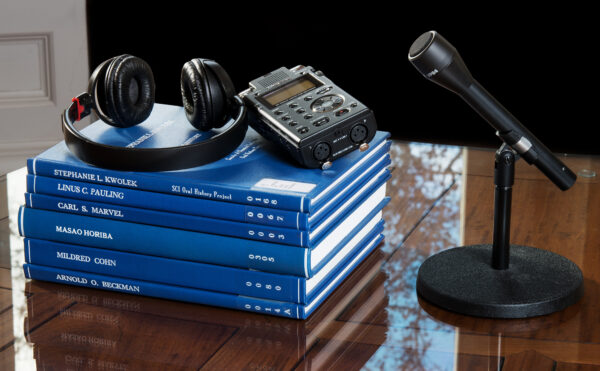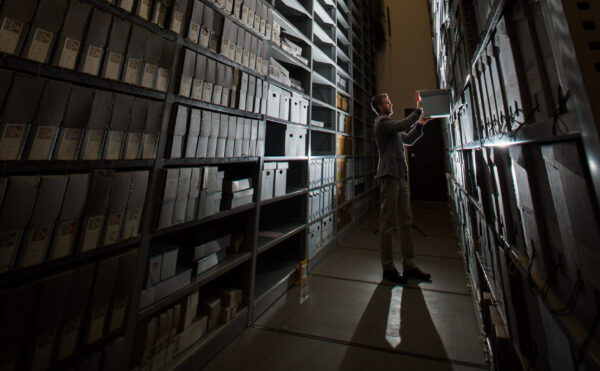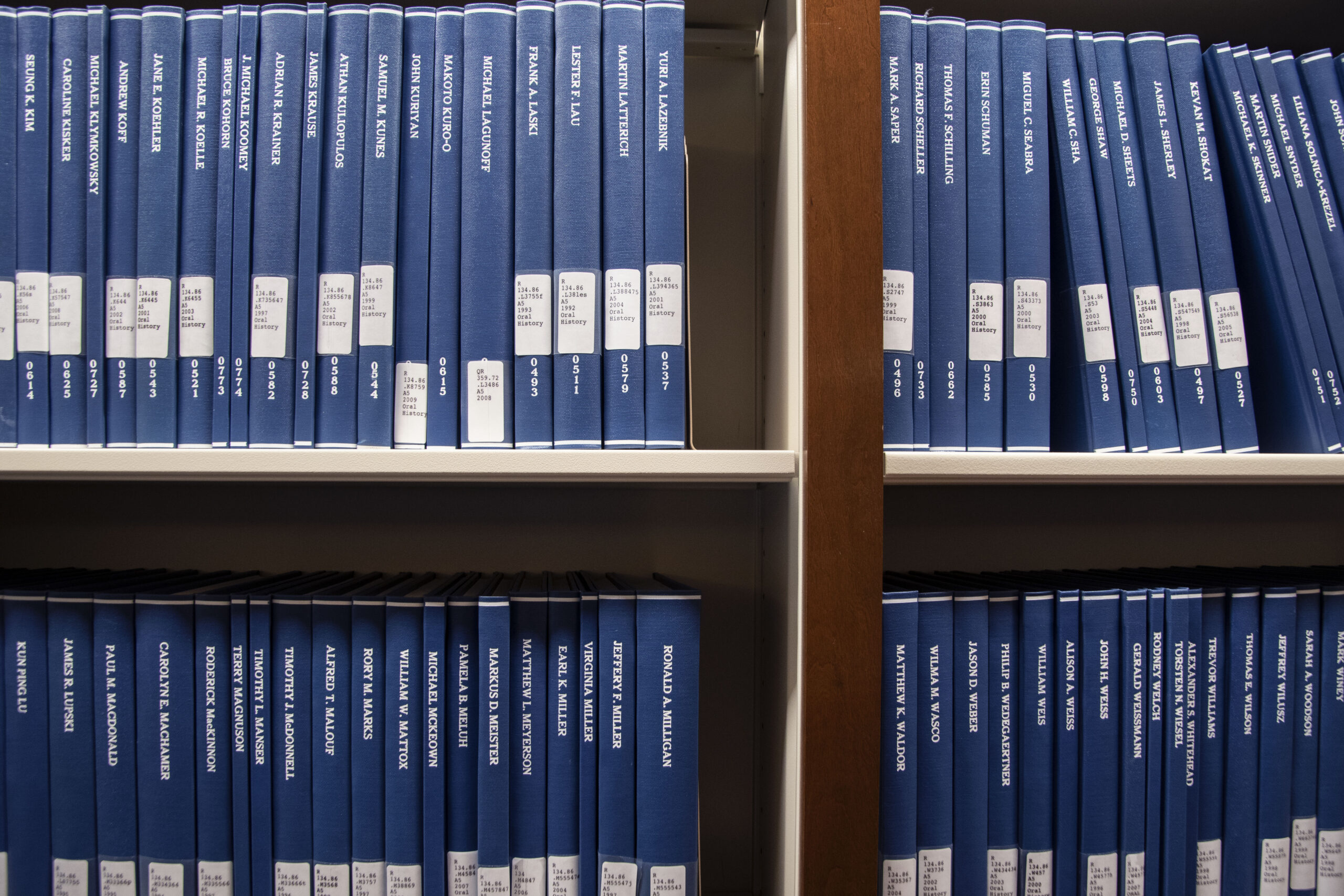Oral History FAQs
What is an oral history interview?
An oral history interview is a recorded discussion between a trained oral historian and an interviewee (or narrator). Oral histories may be narrowly focused on a particular event or era of historical significance that the narrator participated in or witnessed. Alternatively, oral histories may take the form of life-history interviews, in which the interviewer and narrator explore the narrator’s experiences of early childhood, education, career, family life, etc.
The oral histories we conduct—like the majority of the oral histories in the Science History Institute’s collection—are life-history interviews. This more in-depth approach to capturing the experiences of those who pursue training and careers in STEM fields assists researchers from a variety of disciplines in their work, and also provides those who are interested in pursuing a career in science with insight and strategies for their own career.
Why do people choose to participate in an oral history interview?
Published histories of events and eras, whether intended for an academic audience or for a wider readership, long relied on official documents, correspondence, newspaper accounts, and other sources composed, compiled, and preserved by members of the political, professional, and social elite. Oral history interviews provide an opportunity for people whose perspectives are often omitted from official and public records to reflect on the way historical events have played out in their lives and on their own roles in shaping history. Oral history interviewees are typically motivated by a desire to share their stories—their experiences and the lessons they’ve drawn from them—with future generations of researchers and historians to help round out the story of the past.
Who conducts the interview?
Interviews are conducted by our Center for Oral History staff, a group of professionally trained oral historians who adhere to the professional guidelines laid out in the Oral History Association’s Principles and Best Practices. They prepare for each interview by conducting broad subject-area research, as well as background research into each narrator. This background research helps them to draw up an “interview protocol,” or outline of the topics they hope to cover with the narrator over the course of the interview.
Our standard practice is to have two interviewers conduct each interview; usually one will take the lead role while the other will monitor the recording equipment and may interject with follow-up questions or requests for clarification at times.
How should I prepare for the interview?
There is no special preparation needed. The oral history interview will focus on your own memories and experiences, so you are already the expert. That being said, some interviewees do find it helpful to review photo albums, diaries, their own CVs or resumes, or other historical and biographical material that might help jog their memories before the interview. You may even choose to make some or all of this material available to the interviewers either before or during the interview session. Copies of images or articles discussed during the course of the interview can also be included as supplemental material in the final transcript.
Interviewees sometimes request that we provide them with a list of questions in advance of the interview. We are unable to do so because we rarely, if ever, work from a list of questions. Rather, as noted above, our interviewers prepare an interview protocol that maps out the topics to be explored during the interview; questions and follow-ups usually arise naturally as the discussion unfolds.
Where will the interview take place?
We conduct the majority of our interviews in the narrator’s home, office, or laboratory space. We believe it’s particularly valuable to meet our interviewees where they live and work, as some of the discussion will focus on the ways our interviewees navigate the physical, social, and virtual spaces around them. But we also conduct interviews virtually via video conference. Whatever your preference is—in-person, virtual, or a combination thereof—is how we will proceed with the interview.
Regardless of whether the interview is taking place in-person or virtually, when considering a particular room for the interview setting, we request a quiet space to ensure good audio recording. If the interview is in-person, we also ask for seating for all the participants in the interview session (interviewer, interviewee, and any interpreters or other assistants who will be involved), access to electrical outlets for the recording equipment, and good lighting. For virtual interviews, a high-speed internet connection is critical.
How long does an interview last?
Life-history interviews usually take four to six hours and are conducted over multiple sessions. We generally find that individual sessions don’t last more than three hours, and if the session is scheduled to take two hours, a short break in the middle is helpful for all participants. We’re happy to tailor the number and length of interview sessions to fit your needs and schedules.
How will the interview be recorded?
We always use audio recorders for in-person interviews, but may also bring video recording equipment if warranted and if the interviewee is interested. For virtual interviews, we use the video conferencing platform’s built-in recording functionality. We transcribe all recordings and you will be given the opportunity to review the recordings and transcripts for accuracy.
What if there are questions I don’t feel comfortable answering?
As professional oral historians, our interviewers are accustomed to exploring narrators’ life stories while respecting their privacy and dignity. Throughout the interview, you always have the right to decline to answer any question. We can also discuss with you before the interview what, if any, topics you consider off-limits for the interview.
Will I have the opportunity to review the recordings and the transcript of the interview?
Before we finalize your interview, we provide you with a copy to review in any format or combination of formats you prefer: digital, print, audio, and/or video.
How will the recordings and the transcript of my interview be maintained and made accessible to others?
All interviews are preserved and made available in our library and are freely accessible to researchers for noncommercial, educational purposes. Occasionally, when researchers are not able to come to the Institute to use our oral histories, members of our Center for Oral History staff make arrangements to provide researchers with electronic or print copies of our interviews. The Institute may also draw on interview materials for online, in-house, and collaborative educational exhibitions and programming.
Will the recordings and/or transcript of the interview be available online?
As a standard practice, the Institute does not upload entire interviews to the internet. We do, however, provide information about each interview on our digital collections website, and all interviews are fully text searchable.
Our oral histories are meant to reach multiple audiences from a variety of interests and backgrounds, including online audiences. To achieve this goal, we may ask for permission to make your interview more accessible online and will work in full cooperation with each individual narrator.
Additional questions?
Email David Caruso, director of the Center for Oral History, at dcaruso@sciencehistory.org.



